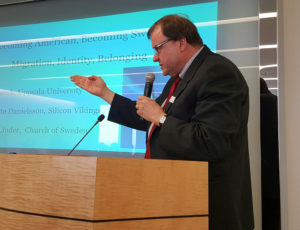Guest blogger: Adam Sabir, Chair of the Doctoral Board
The Management Council arrived in San Francisco in the morning. The day’s business began with a meeting with representatives from Berkeley. The Uppsala delegation was met by Tsu-Jae King Liu, Vice Provost for Academic and Space Planning, Jeroen Dewulf, Director of the Institute of European Studies, and Pat Schlesinger, Interim Associate Vice Chancellor for Research. The Memorandum of Understanding between Uppsala and Berkeley has expired and needs renewing, which gives both parties a reason to identify new fields for future cooperation. Berkeley likes to underline its student-friendly approach as a pillar of its success. The favourable student-teacher ratio certainly reflects this approach. New recruitment focuses on future promise and applies a long-term perspective. Berkeley considers it natural to be a catalyst for social mobility and wants its international partners to share its basic values and its pursuit of excellence. Pat Schlesinger told us that of the USD 700 million that Berkeley allocates to research each year, 60% is federal funding. This makes Berkeley one of the universities, alongside Johns Hopkins and others, that may be hit hard by the Trump administration’s proposed cutbacks. The areas on which the administration has taken a particularly sceptical position include environmental and climate research, as well as parts of the NASA research conducted at Berkeley. However, Schlesinger believed that larger cutbacks would affect all the university’s areas of activity. One consequence of the proposals is that Berkeley has looked further afield and established cooperative arrangements in Asia in particular. There is also some interest in finding ways to collaborate with European universities and projects co-financed by the EU.
After this, the delegation had an internal meeting to follow up our impressions from the discussions before dividing into groups. The programme included a visit to the Clinical and Translational Science Institute (CTSI), where possible cooperation in specific areas could be explored. The Vice-Chancellor had a chance to meet some of the alumni organised in Uppsala University’s Bay Area Alumni Chapter. The chapter is chaired by Lars E. Johansson of K&L Gates. The Vice-Chancellor also had time to discuss important issues with philanthropist and Consul-General Barbro Osher. As for me, I joined the group that visited the Institute of European Studies. Deputy Vice-Chancellor Anders Malmberg and Vice-Rector Torsten Svensson were also in this group. The Institute’s Director, Jeroen Dewulf, described the work of the Institute as promoting interest in Europe and studies with a European focus. The Institute would be happy to serve as a node or ‘clearing house’ for contacts between Uppsala and Berkeley. Agreements between Uppsala and Berkeley were discussed on some of the more specific proposals, as well as a Sweden programme modelled on a successful France programme involving many disciplines at Berkeley. The potential and requirements for doctoral student exchanges and exchanges under Uppsala’s visiting professors programme were also discussed. Another popular trend at Berkeley has been for undergraduates to visit a host country in the summer for eight weeks of work experience and summer courses. The possibility of Uppsala becoming the first Scandinavian higher education institution to host such exchanges was a set item on the agenda.
In the evening it was time for all members of the delegation to gather at K&L Gates for an alumni event. Many alumni and guests had registered to attend and everyone described the discussions as very fruitful and rewarding. Professor Dag Blanck lectured during the evening on the meaning of citizenship and the differences between Sweden and the United States in the way this issue is seen. During the panel discussion that followed, Louise Linder from the Church of Sweden and Charlotte Danielsson from Silicon Vikings shared their views on American Swedishness.
Adam Sabir, Chair of the Doctoral Board

